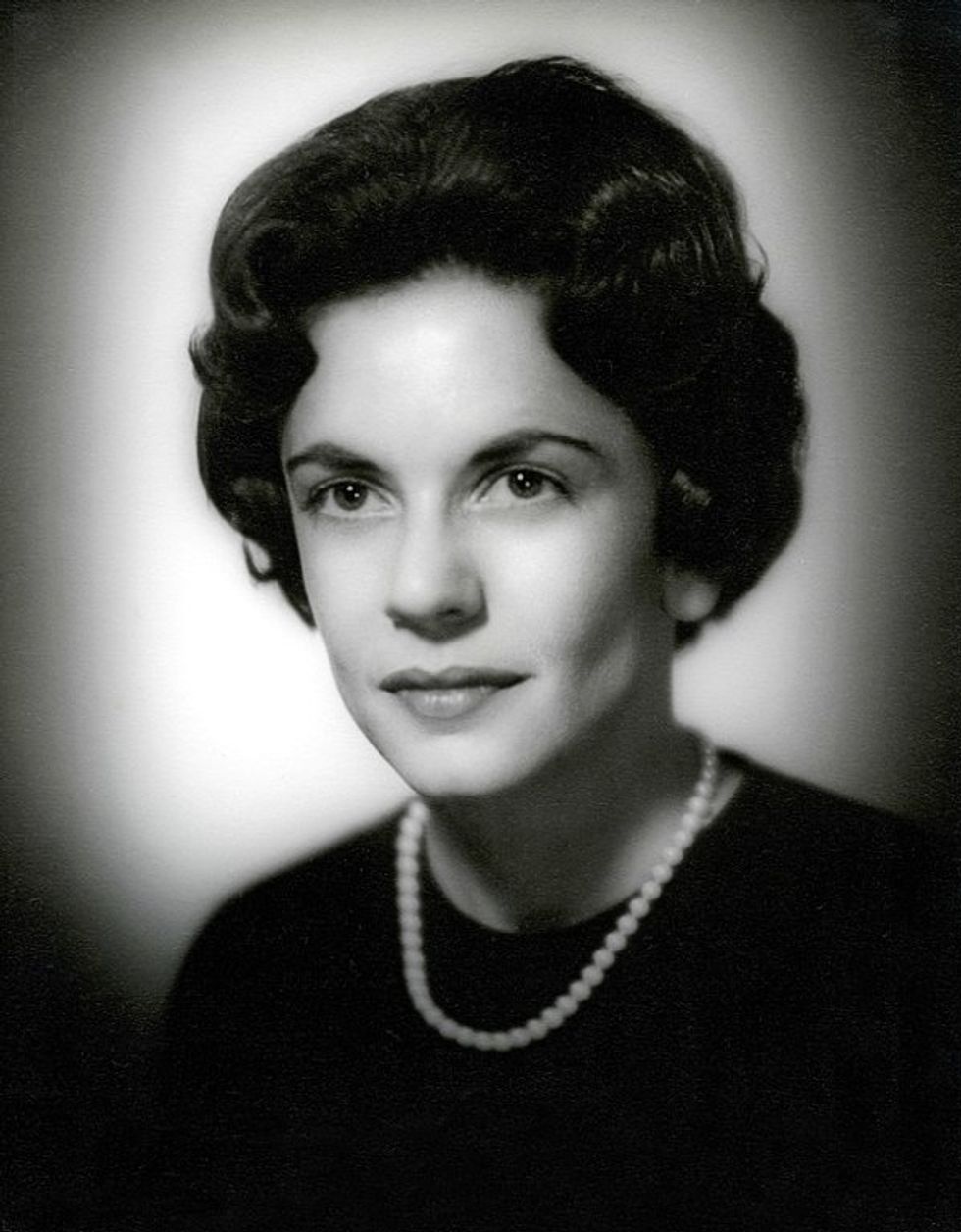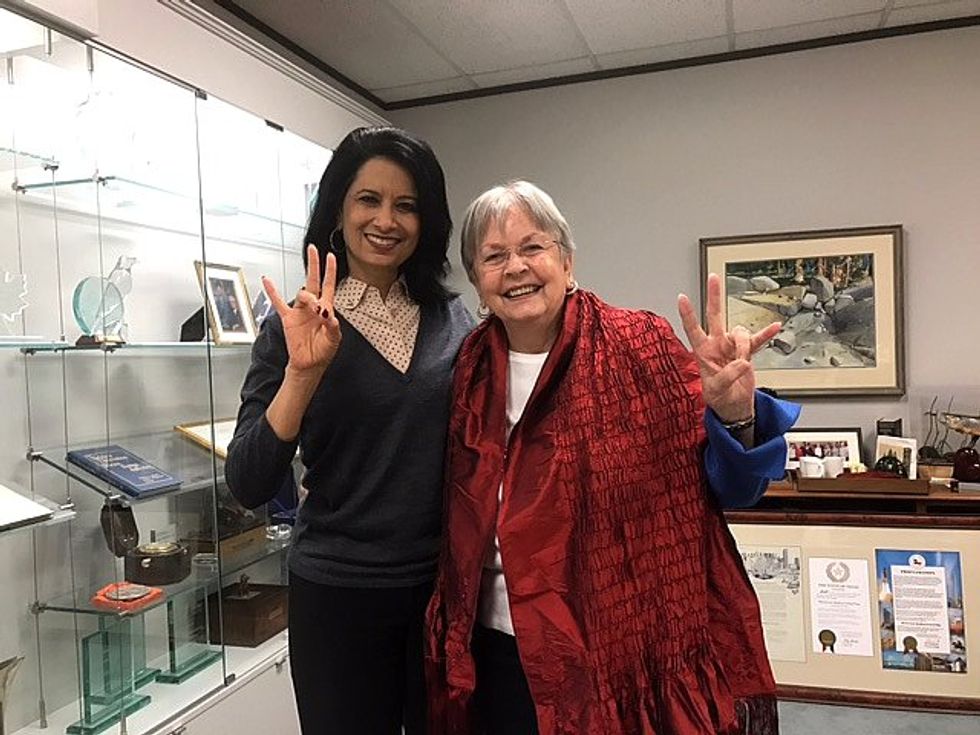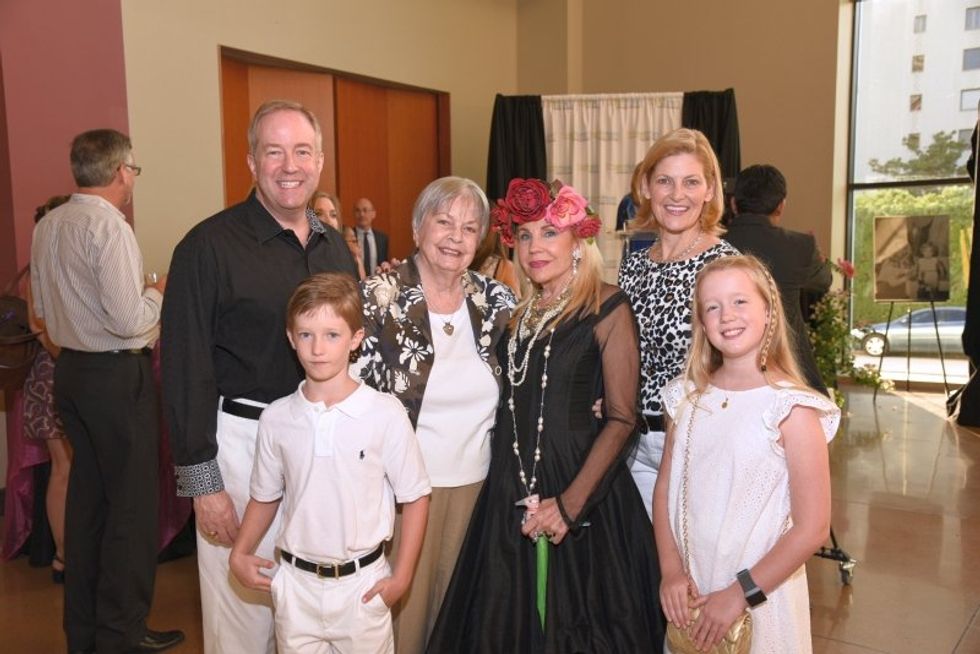honoring Kathrine g. mcgovern
Remembering powerhouse philanthropist Kathrine G. McGovern, who quietly helped transform Houston forever

Kathrine C. McGovern flashes a smile at the christening of the McGovern McGovern Medical School in 2015.
(Editor’s note: As we remember a Houston titan, we speak to those whose lives and organizations she so greatly improved.)
In today’s world of loud, instant promotion and publicity for the smallest of deeds, Houstonians should — by rights — know all about Kathrine G. McGovern, who passed away on Friday, December 1 at age 90.
The McGoverns’ names are prolific and mark major entities all around the city: medical schools, art colleges, the zoo, even the beloved Centennial Gardens in Hermann Park. Together and through their foundation, Dr. John P. McGovern (who passed away in 2007) and his beloved Kathrine led tireless philanthropic efforts including a staggering $163 million — alone — to three major city entities: UTHealth Houston (some $93 million across six schools); the Houston Zoo ($50 million); and University of Houston ($20 million).
Yet, few in the city know virtually anything of these two titans. And that’s exactly how these two old-guard, private, diligent benefactors liked and wanted it. Though they unquestionably deserve it, this is a couple who would absolutely scorn their inclusion on a Mt. Rushmore of Houston, if one existed.
Kathrine G. McGovern: The consummate Houstonian
A consummate, quintessential Houstonian through and through, Kathrine McGovern (née Galbreath) was born on September 15, 1933 to parents Marian and Joseph Galbreath at what is now Children's Memorial Hermann Hospital. Her obituary reveals that her formative years during the Great Depression in Montrose taught her the importance of family, a strong work ethic, education, and community service.
She often observed her father struggle to make ends meet as a builder and architect, and he suddenly died in 1947, her mother continued to instill in her — and her sister, Val — the importance of hard work and service to the community. Her education is a checklist of Houston household names: River Oaks Elementary, Lanier Junior High, Lamar High School, and University of Houston.

Fate led Kathrine Galbreath to a job as office manager at Dr. John McGovern’s allergy clinic in the ’50s. In 1961, Dr. John and Kathrine wed at the Palmer Episcopal Church, toasting the day with a few friends and a bottle of champagne in the parking lot. That same year, Dr. McGovern launched his eponymous foundation with $10,000.
The rest, as they say, is history, and the McGoverns continued their hushed, city-first support of their home, choosing quiet benevolence over pomp and limelight.
A memorial service is planned for 11 am Wednesday, December 13 at St. Paul's United Methodist Church (5501 Main St.); those interested can find information on services, donations, and the live-stream here.
Houston honors a benevolant benefactor
News of Kathrine McGovern’s sudden passing first privately circulated early Friday, December 8. True to form, not much information was shared, other than the magnanimous 90-year-old passed away peacefully in her home. So quietly was word spread, CultureMap actually alerted some of her beneficiary institutions of her passing.
To that end, we approached those who knew her well and worked alongside her, namely William C. Shrader, a 40-year family friend, trusted, inner-circle advisor, and director and vice president of their quietly transformative John P. McGovern Foundation.
More from Shrader soon, but first, some reactions from across the city and organizations who benefitted mightily from the McGoverns’ generosity.
Lee Ehmke, president and CEO of the Houston Zoo. In 2018, the McGovern Foundation s helped permanently transform the zoo with a game-changing, $50 million donation.
“Mrs. McGovern’s commitment to the Houston Zoo was nothing short of extraordinary,” says Lee Ehmke, president and CEO of the Houston Zoo. “From a significant gift that made the Dr. John P. McGovern Children’s Zoo a possibility in 1998 to her latest game-changing donation to launch the Zoo’s centennial Keeping Our World Wild fundraising campaign, our Zoo simply would not be what it is today without her generous support. Her philanthropy has shaped our Zoo into the thriving hub for wildlife connections, conservation, and education it is today. Beyond her role as a benefactor, Mrs. McGovern was a cherished friend to many within the Zoo’s team.”
Andrew Davis, founding dean of the Kathrine G. McGovern College of the Arts, so named after a massive, $20 million gift from the McGovern Foundation. With the gift, Kathrine G. McGovern, a UH alum, fused her love of art and education.

“I think what struck me most about working with Kathy is that she really loved and respected people. She loved the university and what it had done for her, but even more it seemed like she had so much respect for what her mentors had done for her.
She talked all the time about her mentors at the university, and about meeting Dorothy Hold, and it was always with such admiration! She considered herself so privileged to have worked with all these people. She was full of joy about having met so many interesting people in her life, and she loved to tell stories and talk about them.”
John Arcidiacono, president and CEO of The Health Museum, formally known as the John P. McGovern Museum of Health and Medical Science. What is known here as simply The Health Museum owes much of its launch and development to the McGoverns’ pivotal gifting, dating back to 1969.

“Kathrine G. McGovern was a beacon of light in our community. Her contributions to The Health Museum and her passion for health education will continue to inspire us. She will be dearly missed, but her legacy will live on.”
A trusted friend, advisor, and confidant remembers a Houston titan
These remembrances bring us to the aforementioned William C. Shrader, who enjoyed a close friendship and working relationship with the notoriously private Kathrine McGovern. Shrader spoke at length to CultureMap about his friend of more than four decades, and what she and her husband ultimately mean to Houston.
CultureMap: Thank you for speaking to us during this difficult time. Those of us who crossed paths with Mrs. McGovern and heard stories recall her to be someone who notoriously avoided the spotlight, which makes your insight crucial. How did you first meet her?
Willam Shrader: I did legal work for Dr. McGovern for about almost 40 years and I met Mrs. McGovern during that time. After he passed away and they asked me to be on the board, I became closer to her and spent more time with her, and understood her as a person.
CM: What can you tell us about the private lady behind the landmark, public gifts?
WS: Your original statement is accurate: She shied away from the publicity, as did her husband, Dr. McGovern. They wanted their money to go to good causes that would benefit Houston — and the people of Houston. And so, they weren’t interested in all the publicity and notoriety; they were interested in what the impact of their gifts could be.
CM: They’d probably hate this question, no doubt, but the numbers are astounding. UTHealth Houston tells us the McGoverns gifted around $93 million alone across the six schools. And then, there’s the $20 million to the University of Houston, to say nothing of $50 million to the zoo. How did they do it?
WS: I think it’s pretty simple. They set up their foundation with a $10,000 deposit and some direction as to how it was to be invested, what percentage was to go where, which was all Dr. McGovern. And it all went very well.
CM: Well, if turning a $10,000 deposit into a nonprofit that gifted $163 million to three entities — alone — is considered having gone “very well,” we may have to adjust our terms for success. Let’s set aside your role as friend and director of the foundation for a moment: From the perspective of a Houston citizen, what is the McGoverns’ legacy?
WS: There are things that strike me now: One thing I remember is that they used to, every day after work, walk hand-in-hand throughout Hermann Park. They lived close by, so they were there all the time and they started noticing things that they thought could be better. And so they worked with the Hermann park service to actually do those things.
And then of course, the zoo: they got very interested in the animals and the exhibits and what could be done to make them better. So that's kind of the impetus for all this: They were always looking for opportunities to help — and without the notoriety.
CM: In this era of headline-grabbing philanthropy, it’s easy to focus on the McGoverns’ massive, multi-million-dollar gifts. But clearly, there are decades of smaller donations to the city, with benefits even felt today.
WS: Yes, there are the myriad of smaller grants that had an impact that weren’t in the millions but certainly were in the thousands or hundreds of thousands that had a big impact on smaller, not-for-profit organizations.
There were multiple gifts to libraries to make them better and for the children that visited them. There are also multiple gifts to parks — large and small — throughout the city, because they thought that was something that all Houstonians could enjoy. And, you know, there wasn’t a whole lot of fanfare.
CM: What was Mrs. McGovern like to work with, as far as day-to-day operations of the foundation? Did you find her to be very hands-on? Was she a visionary, as far as where she wanted you to direct giving?
WS: A little-known fact is that Kathy McGovern was the president and chairman of the foundation. We had monthly board meetings, where we would review materials that had been put together by the staff to support the request for gifts or funding, or whatever.
And I can tell you — I’ve had some experience with other foundations, and I’m not saying this to be negative — but nobody was more into what she did than Kathy McGovern. She read every piece of paper that was in that board package. She asked intelligent questions and she led our discussions.
Of course, we all voted our own conscience, but she was not what you might call a figurehead that didn’t do anything. She rolled up her sleeves and got into it.
CM: It has always struck me that the fact that the average Houstonian doesn’t know much about the McGoverns is absolutely intentional. They seemed to always back game-changing — let’s call it “infrastructural giving” — projects that grew with time, all while nimbly avoiding the slightest appearance of self promotion. They’re a throwback to an old-guard Houston mentality. Would you agree?
WS: Oh yes, I think so. I think they did their due diligence on things that were presented to them as opportunities, like University of Houston, the zoo, certainly UTHealth. And one of the overriding concerns was they didn’t want a whole lot of publicity about that.
They supported the things they thought would benefit the citizens of Houston. They wanted to do good — in the best way they could — and that, I think, was their driving force.
